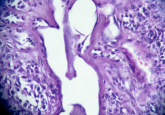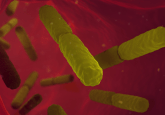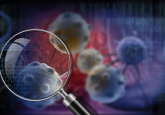So what exactly is AI’s full potential in cancer care?

This week, the ESMO Congress 2023 (20–24 October, Madrid, Spain) set out to explore the answers to this exact question. Several conference sessions were devoted to illustrate exactly how AI has enhanced research and treatments in cancer care.
Despite the enormous potential of AI to revolutionize healthcare, oncology included, clinical applications have thus far been minimal and inconsistent, mainly limited to tumor imaging. This ultimately hinders the benefits that AI could offer to cancer research, prevention, diagnosis, treatment and management.
ESMO recently released an interactive checklist detailing all the recommendations for assessing the report of an oncology real-world evidence (RWE) study, called “Guidance for Reporting Oncology real-World evidence (GROW)”. This guidance helps to overcome implementation barriers by supporting the accurate and transparent integration of AI in oncology.
Improving cancer detection
Raquel Perez-Lopez, a radiologist at the Vall d-Hebron Institute of Oncology (Barcelona, Spain), declared that the lack of AI implementation was due to insufficient guidelines and regulations and that that any current clear guidelines on AI-based cancer screening and diagnosis are not uniformly implemented across different countries, possibly due to financial and cultural factors.
Commenting on research presented at ESMO exploring AI’s promise to enhance cancer diganosis, Perez-Lopez explained, “There are already AI-based platforms that allow the analysis of data routinely collected in electronic health records and medical imaging units, and which could support prevention and screening programmes by identifying individuals at risk of developing the disease. But these resources remain underutilized.”
Creating responsible AI for real-world applications
In cancer genetics specifically, recent research has gained traction by demonstrating the ability of numerous AI tools in identifying the most suitable and optimal targeted cancer therapies based on patient mutations. The tools accurately predicted disease prognosis using this genetic information. Such studies are particularly useful in rare cancer research, where there is usually not enough statistical power to generate strong evidence in clinical trials, due to small patient populations.
ESMO’s GROW guidance encompasses recommendations for the validation and assessment of AI algorithms that analyze data in real-world evidence studies, to ensure that results are disclosed accurately and responsibly.
“Adopting a standard method to assess AI technologies with the same degree of reliability with which we can evaluate medicines in clinical trials will be key to maximizing their benefits, while ensuring that their adoption does not increase the risk of bias that could cause inequalities in patient care,” stated Rodrigo Dienstmann, Editor-in-Chief of ESMO Real World Data and Digital Oncology journal.
Training and educating oncologists
Dienstmann contends that oncologists need to be educated on how to effectively adopt AI into clinical workflows: “there is a lot of apprehension about the impact AI will have on the profession once machines outperform physicians in a number of their traditional repetitive tasks.”
“We need to train doctors to use these tools wisely and confidently based on clear understanding of their value and limitations, so that machines and humans together achieve better results for patients than either of them could on their own. ESMO Real World Data and Digital Oncology journal is a resource for physicians who will be confronted with the implementation of digital oncology in their routine practice.”
AI adoption in oncology is inevitable, and with the increasing use of AI data analysis tools, it is vital that oncology professionals with limited computational backgrounds are educated on how to fully take advantage of these tools. The launch of the ESMO Real World Data and Digital Oncology journal presents one such opportunity for educating healthcare professionals about the true potential of real-world evidence and digital tools in oncology. It is exciting to see where the future of cancer care takes us.





